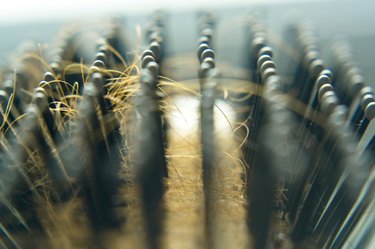
Whether you're male or female, fine, thinning hair can be a source of embarrassment. When your scalp beings to peek through the strands of your hair, you may need to investigate the source of your thinning hair, especially if it's a sudden occurrence. Together with your doctor you can find the source of your thinning hair and explore options to remedy the situation.
Medications
Video of the Day
Some medications cause your hair to fall out or thin over time. Some of these medications include blood thinners, antidepressants and even birth control pills, notes FamilyDoctor.org, a website maintained by the American Association of Family Physicians. If you notice a change in your hair after starting a new medication, you'll need to see your doctor about choosing another type of medication to manage your condition.
Video of the Day
Genetics
If you have a family history of fine, thin hair, then it may be a fact of life for you and your family. Male pattern baldness is the most common reason for thinning hair in men, according to MedlinePlus. Even if you're a woman with fine, thin hair, it could simply be genetics that causes hair to grow finely, thin with age or fall out altogether. Anti-hair-loss drugs and products may be employed to slow the loss of hair.
Medical Condition
Fine, thin hair could be the result of a medical condition. Thyroid issues, hormonal issues and malnourishment can all cause hair to become finer and thinner, notes TeensHealth, a division of the Nemours Foundation. If you notice sudden hair thinning, it's important to see your doctor for testing to rule out a possible medical problem as the underlying cause.
Styling
The way you treat your hair may have a bearing on the condition and thickness of your hair. For instance, if you routinely use track hair extensions, you could be afflicted with a thinning called "traction alopecia," which is a thinning or balding near the crown of the head due to excessive pulling and braiding, notes the International Society of Hair Restoration Surgery. Using too many chemical processes or styling your hair roughly with heated styling tools can also lead to thinning, especially for those prone to fine, weak hair.
Stress
Stress can cause your hair to thin, according to Mayo Clinic psychiatrist Daniel K. Hall-Flavin. When you experience something stressful, such as a death in the family, a divorce or a high-stress job, your growing hairs are pushed into a resting phase instead of continuing the growth cycle, so your hair appears to be finer and thinner. Once you regain some peace in your life, the hair likely will begin to grow again, although it may take months, Hall-Flavin notes.
Is this an emergency? If you are experiencing serious medical symptoms, please see the National Library of Medicine’s list of signs you need emergency medical attention or call 911.